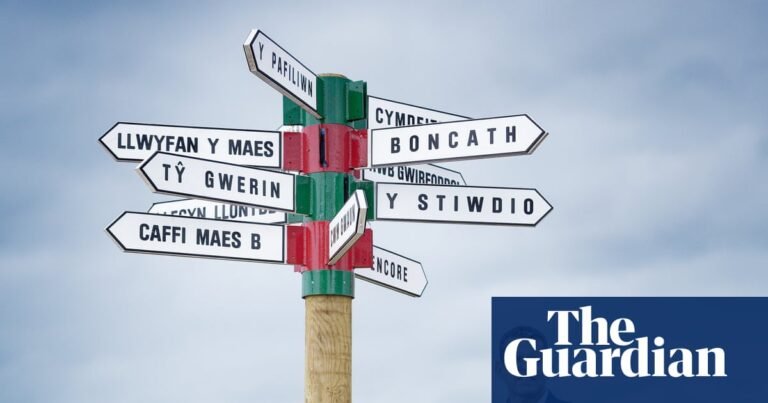It is fair to say that Rhun ap Iorwerth, the leader of Plaid Cymru, was on safe ground at the national Eisteddfod in Wrexham this week. More than once, festivalgoers interrupted his interview with the Guardian to shake his hand or take a selfie.
Ap Iorwerth has just embarked on a nationwide “listening tour” during which he will visit every Welsh constituency, beginning in Wrexham, before the Senedd elections next May.
On Tuesday, the Welsh nationalist party celebrates its 100th anniversary, and ap Iorwerth believes he is on the verge of delivering the best present the party could ever ask for: ending Labour’s long reign to win power in Wales for the first time.
“Wales gave Keir Starmer his big majority but I don’t think [voters] expected this barrage of bad policy, passing on the cost of the failures of successive governments to the most vulnerable,” the 52-year-old said of the UK Labour government’s refusal to lift the two-child benefit cap and attempts to cut the winter fuel payment and disability benefits.
“There is an appetite for breaking that cycle like never before and Plaid Cymru is ready to deliver.”
Plaid Cymru recorded its highest ever vote share in last summer’s general election, returning four MPs and eating into Labour’s support in heartlands such as the south Wales valleys and Cardiff.
Recent polls suggest that after 102 years of straight election wins in Wales, Labour’s base has collapsed, and the party will come third next May under a new proportional voting system and an increase in the size of the parliament.
Plaid Cymru and Reform UK are neck and neck – but since Labour and Plaid have said they will not go into coalition with Nigel Farage’s outfit, it is only the Welsh nationalist party that has a shot at forming a government. Plaid Cymru has finished its candidate selection process, and ap Iorwerth is already out knocking on doors; Labour and Reform UK have barely begun putting together their lists.
A century after its founding, ap Iorwerth said Plaid Cymru had a proven track record at the local level, and was ready to step up. He said the first minister, Eluned Morgan, was “encouraging people to continue voting Labour because they’re the only party with experience of being in government. That is profoundly undemocratic … They consider themselves the ruling class.”
“Twenty-six years of Labour ever since devolution is an unusual and unhealthy situation. We use the words ‘fresh start’ for a reason.”
Ap Iorwerth said he was not concerned about the rapid growth of support for Reform UK in Wales, or why his own party had not pulled ahead in the polls.
“We asked strategists how to attract hardcore Reform voters, and the answer, basically, was ‘Don’t be Plaid Cymru,’” he said.
skip past newsletter promotion
Our morning email breaks down the key stories of the day, telling you what’s happening and why it matters
Privacy Notice: Newsletters may contain info about charities, online ads, and content funded by outside parties. For more information see our Privacy Policy. We use Google reCaptcha to protect our website and the Google Privacy Policy and Terms of Service apply.
after newsletter promotion
“I’m quite sure Reform will fizzle out, but Plaid Cymru won’t. We are here to stay, and Wales is our focus. Reform has made it clear Wales is important to them, but only because it is a stepping stone to the next general election.”
Instead, Plaid Cymru is attracting disillusioned Labour voters – including a trickle of defecting Labour councillors – and is overwhelmingly popular with younger people. YouGov polling from May suggested Plaid holds the support of 46% of 16- to 24-year-old voters, far ahead of the Greens on 21% and Labour on 16%, and a clear lead among 25- to 49-year-olds, with 36% of the vote.
Under the new voting system, every single seat in Wales will be newly competitive, including a three-way battle between Labour, Plaid and Reform for the Welsh valleys. The stakes are high. Like the Scottish National party before its 2007 breakthrough, Plaid Cymru must overcome the perception that it is a party of grievance; and the prospect of Reform becoming the biggest party in the next Senedd would be a humiliating setback for Plaid, the party that promises to put Wales first.
Although independence is his party’s raison d’etre, ap Iorwerth has already ruled out holding a Welsh independence referendum even if the party enters government in the next four-year Senedd term – in part to sway more cautious traditionally Labour voters.
“We have to get to grips with the issues first and make the most of the powers that we already do have in Wales. But every day I’ll be making the case for our potential, which I think won’t be realised until we’re an independent nation. It’s my job to persuade people to come with us on that journey,” he said.
“Ultimately it’s about giving people hope that what we have now is not as good as it gets for Wales. We are the party of ambition.”
